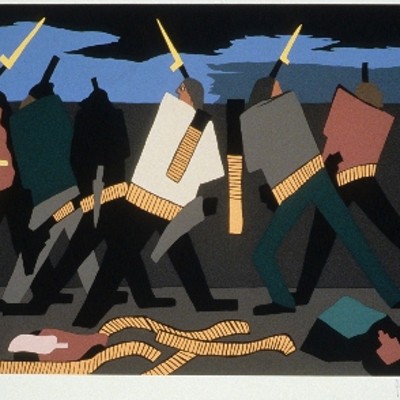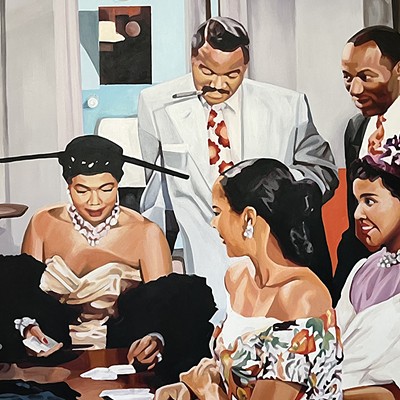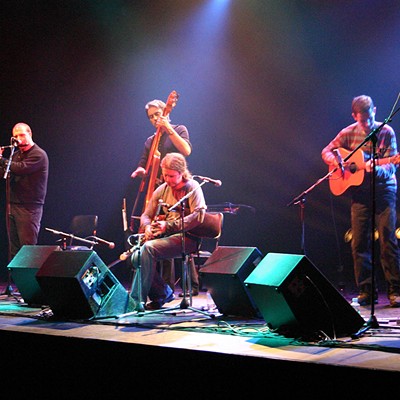ANNE MURRAY OF Tucson's Broadmoor neighborhood posed a question to mayor and Council at the contentious big-box ordinance hearing Monday night.
Do we live in a city, she asked, where "a national corporation trading on the New York Stock Exchange has more to say about what will happen in our neighborhoods than those who live there?"
Murray was referring to Home Depot, the home-improvement retail giant that's planning to install a 131,868-square-foot store at El Con Mall despite the fierce opposition of neighbors.
The answer Murray got was a no, maybe. Mayor and Council voted 5-2 to approve a new ordinance -- Tucson's first -- that puts some limits on new superstores. They rejected an outright ban on stores of 100,000 square feet or more, opting instead to require developers of box stores that big to go through some hoops before building their behemoths. Store plans must wend their way through a public hearing with the city zoning examiner, and then go off to the City Council for another hearing, and a yea or nay vote. They must also abide by tough new rules limiting noise, light and architectural blight.
Under the ordinance, which goes into effect October 27, Home Depot likely will be able to establish a store in the northeast corner of the El Con property if it can withstand possible zoning challenges over parking. Still, neighbors, who had organized themselves into an advocacy group called The Union of Citizens to Save Our Neighborhoods (T.U.C.S.O.N.), pronounced themselves pleased.
"We feel good," said Linda Nadell. "It's a step in the right direction. It's important that there be an ordinance on the books. It's a step to protect neighborhoods."
Though the El Con case prompted the new ordinance in the first place, its provisions will apply to new construction throughout the city. (Projects already approved are grandfathered in.) The new rules will kick in only when proposed stores get to the 100,000-square-foot size, said assistant city attorney Michael McCrory. If Home Depot can get its building permit approved before October 27, it could potentially bypass the new rules. However, a zoning challenge could slow the process down and pitch Home Depot beyond the October 27 deadline, thus subjecting it to the new rules.
And those rules are extensive. Superstores must be set back a substantial 200 feet from neighboring residential properties. No trash collection is permitted between 4 p.m. and 9 a.m.; no idling trucks between 6 p.m. and 7 a.m. Outdoor lights must be of the less intrusive low-pressure sodium variety at night, between 10 p.m. and 7 a.m. Grocery departments can occupy no more than 10 percent of a store's total area, which would put the kibosh on, say, a Wal-Mart "supercenter," a combination supermarket and all-purpose store. (Wal-Mart had been in discussions with El Con for a store on the northwest corner, but has pulled out.)
Six rules governing aesthetics require building materials, rooflines and colors to be compatible with the architecture in nearby neighborhoods; design elements must "contribute to visual interest at the pedestrian scale," and so on. Trash dumps must be screened. The retail applicant must provide a management plan for the storage of hazardous materials -- an issue neighbors have worried about at Home Depot -- and file a traffic impact analysis.
A sometimes boisterous crowd of about 400 gathered at a Tucson Convention Center ballroom for the meeting; they appeared to be about equally divided into pro and con camps. One group hoisted a homemade sign proclaiming "I Love Home Depot," while their opponents waved placards declaring "Truth Matters" on occasions such as the one where a Costco manager claimed that his top employees earned about $17 an hour.
José Rincon, a typical neighborhood speaker, told the Council he enjoys shopping at the superstores and he even worked at Costco during college, though "not at $16 an hour." Nevertheless, he said, the big-box stores don't belong right next to houses. "We're asking for appropriate location, appropriate land use and appropriate protection of our homes."
David Steele, a consultant for the Retail Coalition, pitched the industry argument that "Tucsonans like choice, value and jobs."
Rincon and Steele were typical of the 20 speakers who addressed the mayor and Council before the vote. The speakers alternated between passionate neighbors and homeowners arguing for the sanctity of their homes and appropriate urban design, and a troupe of paid consultants, lawyers and employees of the big superstores extolling the joys of low prices and consumer choice. In fact, of the 10 who spoke against the superstore ordinance, only two did not identify themselves as being on a superstore payroll, which gave some weight to Anne Murray's pointed question. Their speakers' ranks included a Costco manager from San Diego, a Wal-Mart executive from Arkansas, a Home Depot manager from California, a Wal-Mart sales clerk from Tucson, a trio of lawyers working either for Home Depot or the Retail Coalition of assorted superstores, and a consultant representing the Retail Coalition.
Jim Lloyd, the Home Depot real-estate exec from California, turned up homespun in plaid shirt and backpack, a folksy contrast to his fellow suits. Like many of the superstore speakers, he cited an industry survey that claimed 60 percent of Tucsonans are clamoring for a new Home Depot. "A lot of people in central Tucson have asked us a long time for a store," he said. He reiterated the frequently heard contention that such stores create new businesses and pour new tax revenues into the city coffers.
Councilman Jerry Anderson blasted the industry figures, saying an independent study should have been done.
"We need to provide our own economic analysis," he said. "Home Depot and Wal-Mart come to the community with their figures. I want to know for a fact, what impact will this (Home Depot) have on Grant Road Lumber, on Ace Hardware?"
The superstore execs complained at the city's rush to enact a new ordinance (work began just August 2 after a council vote). Councilwoman Shirley Scott, who cast a no vote along with Fred Ronstadt, said the undue speed was the reason for her negative vote. Anderson argued that Tucson's hand was forced by Home Depot, which jumped in with its proposal quickly in late August in an apparent effort to beat the city to the punch.
Anderson also gently chided the city planning staffers, saying that they should have anticipated the changes in the marketplace, in which giant chains and their giant parking lots have altered streetscapes all across America.
"This is not the first issue that we're forced to go on a fast track. Is it our role always to react?" Perhaps, he said, the city should "plan ahead so we're not caught like that."













